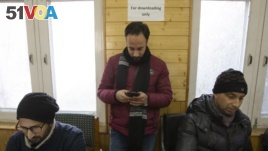19 February 2020
Six months ago, the Indian government canceled Kashmir's constitutional right to limited self-rule. Indian officials also began enforcing a ban on communications in Kashmir.
Late last week, the government described the return of limited, slow-speed internet to the area as a step toward normalcy.
But for the 7 million people who live in Kashmir, there are few signs of normalcy. They are only permitted use of government-approved websites. Social media sites such as Facebook, WhatsApp and Twitter remain blocked. And while users can visit YouTube and Netflix, the internet connection is too slow to watch online videos.

In this Jan. 30, 2020, photo, a Kashmiri journalist, center, browses the internet on his mobile phone inside the media center set up by government authorities in Srinagar, Indian controlled Kashmir. (AP Photo/ Dar Yasin)
Some Kashmiris are getting around the barriers by using VPNs, short for virtual private networks. Such services let users see restricted websites. But Indian officials are looking for stronger ways to restrict VPNs.
"It's still an internet shutdown," said Nikhil Pahwa, an India-based digital rights activist. "Can you imagine this being done to Delhi?"
The part of divided Kashmir that India controls was already one of the most militarized places in the world before last summer. Since then, even more troops have arrived. So have strong restrictions on civil rights and information.
The government said it had to ban the internet to prevent anti-India protests by rebels fighting for independence or unification with Pakistan. Pakistan controls the other part of Muslim-majority Kashmir.
'They've opened a window'
Digital experts say the internet controls in Kashmir are especially severe.
"The internet clampdown in Kashmir is far worse censorship than anywhere in the world," said Pranesh Prakash. He is with Yale Law School's Information Society Project.
The internet ban was partly lifted on January 25. Since then, some Kashmiris have told friends and neighbors about ways to visit banned sites through VPNs. They also have used social media to denounce India's government.
"They made us silent for six months. Now they've opened a window," said a student named Shoaib Rassol. "We'll tell the world what India has done to us."
Shutdowns common
Internet shutdowns are a favored method for the government of Prime Minister Narendra Modi. Since he took office in 2014, the internet has been suspended more than 365 times in India, notes the digital rights group Access Now.
In January, government official Shaleen Kabra said terrorists and anti-national groups were using the internet to "propagate terrorism" and spread false information to cause public unrest.
In Kashmir, internet bans are more common. More than one-third of India's internet bans over the past six years have been enforced in Kashmir. Some of the restrictions have lasted for months.
In 2017, Indian officials blocked 22 social media sites -- including Facebook and Twitter -- and cut 3G and 4G mobile data services for one month in Kashmir. Officials said their actions were aimed at easing tensions, after protests fueled by videos showing reported abuse of Kashmiris by Indian forces.
At the time, United Nations experts said the ban had "the character of collective punishment."
Last week, four members of the United States Senate wrote to Secretary of State Mike Pompeo to express concern about the internet restrictions in Kashmir. The Senators called for its full restoration. U.S. President Donald Trump is to visit India next week.
For Kashmiris, the internet shutdowns are more than troublesome. They have a real human cost.
During the service blackouts, critically ill patients cannot get government healthcare or seek payments for insurance claims online. Students cannot request financial help or take competitive exams. And families are unable to connect with relatives living outside Kashmir.
The internet lockdown has also hurt the area's economy. Tens of thousands of artists became jobless when their works could not be sold online. Local technology companies had to close or re-open offices in other parts of India.
As Kashmiris return online, Indian officials have told commercial internet operators to block VPNs. Observers say such a move could be the start of a new level of government control over information.
Digital rights activist Nikhil Pahwa said, "...This is a norm that has been established -- that it is legal for the state to ask internet service providers to start filtering out most of the internet."
He added, "There's no accountability, no transparency."
I'm Ashley Thompson.
The Associated Press reported this story. Ashley Thompson adapted it for VOA Learning English. George Grow was the editor.
_____________________________________________________________
Words in This Story
shutdown - n. the act of stopping the operation or activity of a business, machine, etc., for a period of time or forever
clampdown - n. an increased effort to make sure that people obey laws and rules — usually singular
censorship - n. the system or practice of censoring books, movies, letters etc. censor - v. to remove things that are considered to be offensive, immoral, harmful to society
accountability - n. the fact or condition of being accountable; responsibility.
transparency - n. the quality that makes something obvious or easy to understand
character - n. the qualities or characteristics that make something interesting or special
restoration - n. the act of bringing back something that existed before — usually + of
insurance - n. an agreement in which a person makes regular payments to a company and the company promises to pay money if the person is injured or dies, or to pay money equal to the value of something (such as a house or car) if it is damaged, lost, or stolen
ill - adj. not well or healthy
propagate - v. to make (something, such as an idea or belief) known to many people